Ample evidence has shown that there are significant disparities in health needs between racial groups when controlling for socioeconomic status, and differences in health coverage may contribute to these disparities. For example, the average life expectancy of African-Americans in 2010 was four years shorter than that of whites; in 2009, the proportion of nonelderly adults lacking insurance was far higher among African-Americans and Hispanics (24% and 43% respectively) than among non-Hispanic whites (16%).
Unemployment Insurance (UI) comprises the main public source of income support for those who experience job displacement. Despite a long literature estimating the incentive effects of UI benefits on job search efforts and unemployment duration, evidence on the consumption-smoothing benefits of UI is more limited.
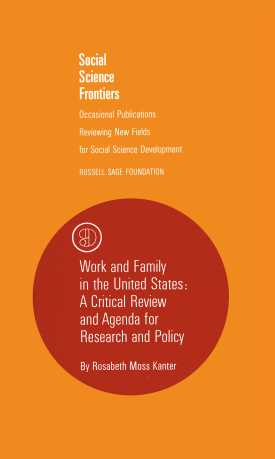
Work and Family in the United States
About This Book
Now considered a classic in the field, this book first called attention to what Kanter has referred to as the "myth of separate worlds." Rosabeth Moss Kanter was one of the first to argue that the assumes separation between work and family was a myth and that research must explore the linkages between these two roles.
ROSABETH MOSS KANTER holds the Ernest L. Arbuckle Professorship at Harvard Business School, where she specializes in strategy, innovation, and leadership for change.
Download
RSF Journal
View Book Series
Sign Up For Our Mailing List
Apply For Funding
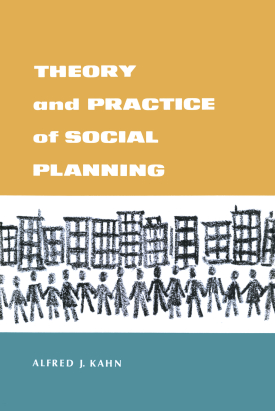
Theory and Practice of Social Planning
About This Book
Discusses the intellectual processes involved in social planning. Professor Kahn provides critical tools for the analysis of the planning process, and shows what social planning is and can be. Clarifying the major phases in the planning process, he shows how planning can succeed or fail at any one of these stages. He examined planners in their various roles: as "neutral" technicians and as advocates, as representatives of interest groups and as public officials.
The book describes both the social aspects of planning and the relationship between social and physical plans.
ALFRED J. KAHN was professor of Social Policy and Planning at the Columbia University School of Social Work.
Download
RSF Journal
View Book Series
Sign Up For Our Mailing List
Apply For Funding
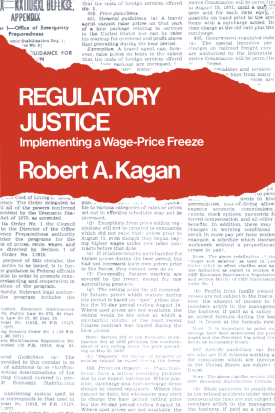
Regulatory Justice
About This Book
Regulatory Justice is based on a case study of two closely linked federal agencies—the Cost of Living Council (CLC) and the Office of Emergency Preparedness (OEP)—which administered a nationwide wage-price freeze in 1971.
ROBERT A. KAGAN is Professor of Political Science and Emanuel S. Heller Professor of Law at the University of California, Berkeley.
Download
RSF Journal
View Book Series
Sign Up For Our Mailing List
Apply For Funding
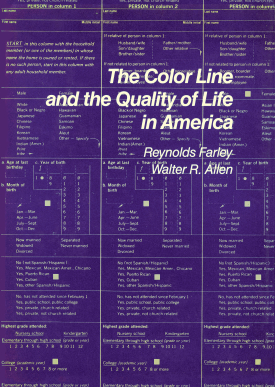
The Color Line and the Quality of Life in America
About This Book
Is the United States a nation divided by the “color line,” as W.E.B. Dubois declared? What is the impact of race on the lives of Americans today? In this powerful new assessment of the social reality of race, Reynolds Farley and Walter Allen compare demographic, social, and economic characteristics of blacks and whites to discover how and to what extent racial identity influences opportunities and outcomes in our society. They conclude that despite areas of considerable gain, black Americans continue to be substantially disadvantaged relative to whites.
REYNOLDS FARLEY is professor of sociology at the University of Michigan and research scientist at its Population Studies Center.
A Volume in the RSF Census Series
Download
RSF Journal
View Book Series
Sign Up For Our Mailing List
Apply For Funding
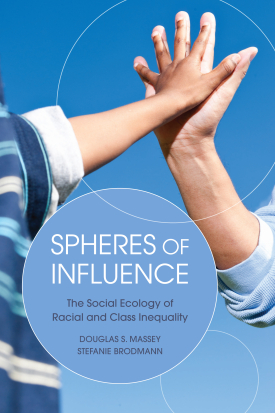
Spheres of Influence
About This Book
“Douglas Massey and Stefanie Brodmann provide an ambitious and rigorous examination of how inequality exerts its influence in the lives of young Americans. Analyzing a national longitudinal study and focusing on multiple social contexts—including school, religion, peers, and neighborhoods—the authors discover important new facts and evaluate competing explanations for a diverse set of outcomes. Whether about depression, crime, sexual behavior, obesity, drinking, or human capital attainment, the results are fascinating. Spheres of Influence should be required reading for social scientists and policymakers seeking comprehensive knowledge on the social ecology of class and race inequality.”
—Robert J. Sampson, Henry Ford II Professor of the Social Sciences, Harvard University
“Spheres of Influence is a pathbreaking book exposing the vast complexities in how race and class intersect in affecting development and well-being as people move from adolescence into adulthood in the United States. The comprehensiveness of the theory and findings about the ways that highly diverse social ecologies of family, school, neighborhood, peers, and religion set the stage for vast inequalities in social outcomes is unparalleled.”
—Lauren J. Krivo, professor of sociology and criminal Justice, Rutgers University
The black-white divide has long haunted the United States as a driving force behind social inequality. Yet, the civil rights movement, the increase in immigration, and the restructuring of the economy in favor of the rich over the last several decades have begun to alter the contours of inequality. Spheres of Influence, co-authored by noted social scientists Douglas S. Massey and Stefanie Brodmann, presents a rigorous new study of the intersections of racial and class disparities today. Massey and Brodmann argue that despite the persistence of potent racial inequality, class effects are drastically transforming social stratification in America.
This data-intensive volume examines the differences in access to material, symbolic, and emotional resources across major racial groups. The authors find that the effects of racial inequality are exacerbated by the class differences within racial groups. For example, when measuring family incomes solely according to race, Massey and Brodmann found that black families’ average income measured $28,400, compared to Hispanic families’ $35,200. But this gap was amplified significantly when class differences within each group were taken into account. With class factored in, inequality across blacks’ and Hispanics’ family incomes increased by a factor of almost four, with lower class black families earning an average income of only $9,300 compared to $97,000 for upper class Hispanics. Massey and Brodmann found similar interactions between class and racial effects on the distribution of symbolic resources, such as occupational status, and emotional resources, such as the presence of a biological father—across racial groups. Although there are racial differences in each group’s access to these resources, like income, these disparities are even more pronounced once class is factored in.
The complex interactions between race and class are apparent in other social spheres, such as health and education. In looking at health disparities across groups, Massey and Brodmann observed no single class effect on the propensity to smoke cigarettes. Among whites, cigarette smoking declined with rising class standing, whereas among Hispanics it increased as class rose. Among Asians and blacks, there was no class difference at all. Similarly, the authors found no single effect of race alone on health: Health differences between whites, Asians, Hispanics, and blacks were small and non-significant in the upper class, but among those in the lower class, intergroup differences were pronounced.
As Massey and Brodmann show, in the United States, a growing kaleidoscope of race-class interactions has replaced pure racial and class disadvantages. By advancing an ecological model of human development that considers the dynamics of race and class across multiple social spheres, Spheres of Influence sheds important light on the factors that are currently driving inequality today.
DOUGLAS S. MASSEY is Henry G. Bryant Professor of Sociology and Public Affairs at the Woodrow Wilson School.
STEFANIE BRODMANN is an economist at the Social Protection and Labor Unit of the World Bank.
RSF Journal
View Book Series
Sign Up For Our Mailing List
Apply For Funding
Pagination
- Previous page
- Page 63
- Next page
